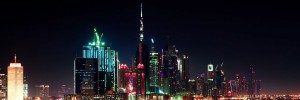By Kevin Brass www.thenational.ae
From a small kiosk in the Dubai Mall the property agent Hamptons International is pitching apartments in a luxury tower with scenic views. It is being built by Emaar, the Dubai developer.

The apartments, however, are in Beverly Hills, California.
Emaar and other Dubai home developers have been aggressively working to diversify their portfolios in recent years, in the wake of the downturn in the emirate.
The companies are casting a wide net, trying to tap into markets with more activity than Dubai. Deyaar, which is best known for being involved in developments in the Dubai Marina and Business Bay, now has projects in Lebanon, Kazakhstan, Turkey and the US. Damac Properties is working on projects in Saudi Arabia, Egypt and Lebanon.
Emaar’s goal is to “grow and at the same time limit concentration risk to the Dubai real estate market”, the company said in a presentation to investors in November.
About a third of Emaar’s property portfolio is now outside the UAE, it was revealed at the presentation.
“They’ve exported the model,” said Chet Riley, an analyst with Nomura Securities. “A lot of their revenue this year will come from the international market.”
Emaar’s biggest expansion has been in Egypt, which represents about 15 per cent of the book value of the company. But it also expects to sell homes this year in Saudi Arabia, Turkey and India.
The company’s assets include a total of 240 million square metres of land in India, Saudi Arabia, Morocco, Pakistan, Syria, Turkey, Egypt and Jordan.
The collection of geographically dispersed assets gives Emaar the opportunity for spin-offs, and ultimately make the portfolio “a little more risk-proof”, Mr Riley said.
Nowhere is Emaar’s strategy more apparent than in the faux marble kiosk in Dubai Mall, which features a video screen offering units in a Californian development called Beverly West. Hamptons International’s Middle East unit, which is operating the kiosk, is owned by Emaar.
Beverly West is Emaar’s first project in the US, a 21-storey building in Beverly Hills, one of the most stylish neighbourhoods in Los Angeles, famous for Rodeo Drive and movie stars. The project offers 35 apartments ranging from 1,770 to 8,215 square feet. Prices start at US$2.5 million (Dh9.1m).
“This is a good time to buy in America; the economy is down,” a kiosk attendant tells a visitor as shoppers browse the nearby Armani and Louis Vuitton stores.
California has suffered some of the biggest price drops in the US, with some neighbourhoods down 50 per cent or more from peak years. Even in Beverly Hills prices are 30 per cent below levels of three years ago, agents say.
“The response to Beverly West residences by visitors to the kiosk has been extremely positive,” a spokesman for Hamptons International said. “The residences have the unique appeal as a holiday or business home given its superior location advantage and highest standard of luxury.”
Vacancy rates are high for new Beverly Hills towers, agents report. The enclave is known for its sprawling mansions, not luxury condominiums. But Beverly West is refusing to drop prices.
“We are going to hold steady,” Bill Simpson, Emaar’s director of sales, told The Hollywood Reporter.
On a Wednesday afternoon, Dubai Mall shoppers were not paying much attention to the Beverly West kiosk but the attendant said the company had made several sales in the past month, primarily to investors. “A lot of GCC nationals live in Beverly Hills,” the attendant added.
Construction on Beverly West is scheduled for completion by the end of this month.












